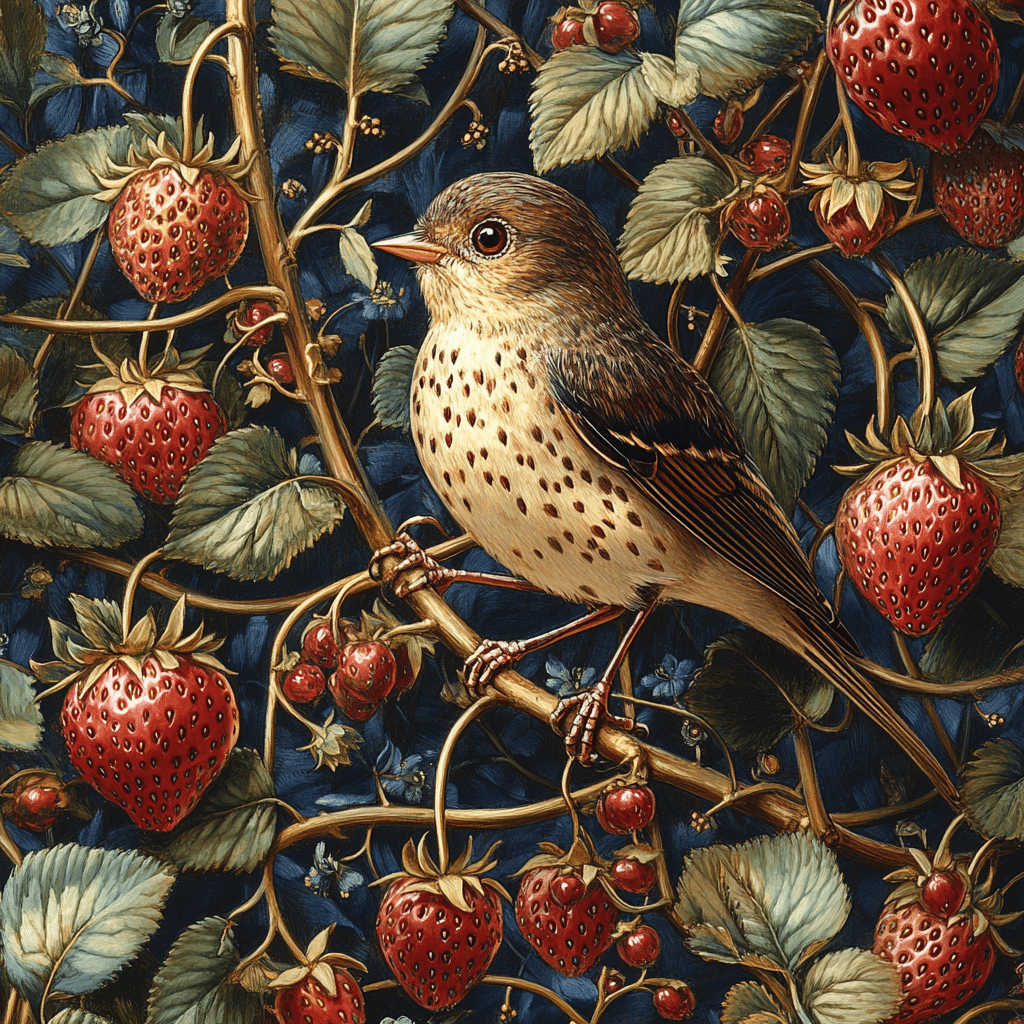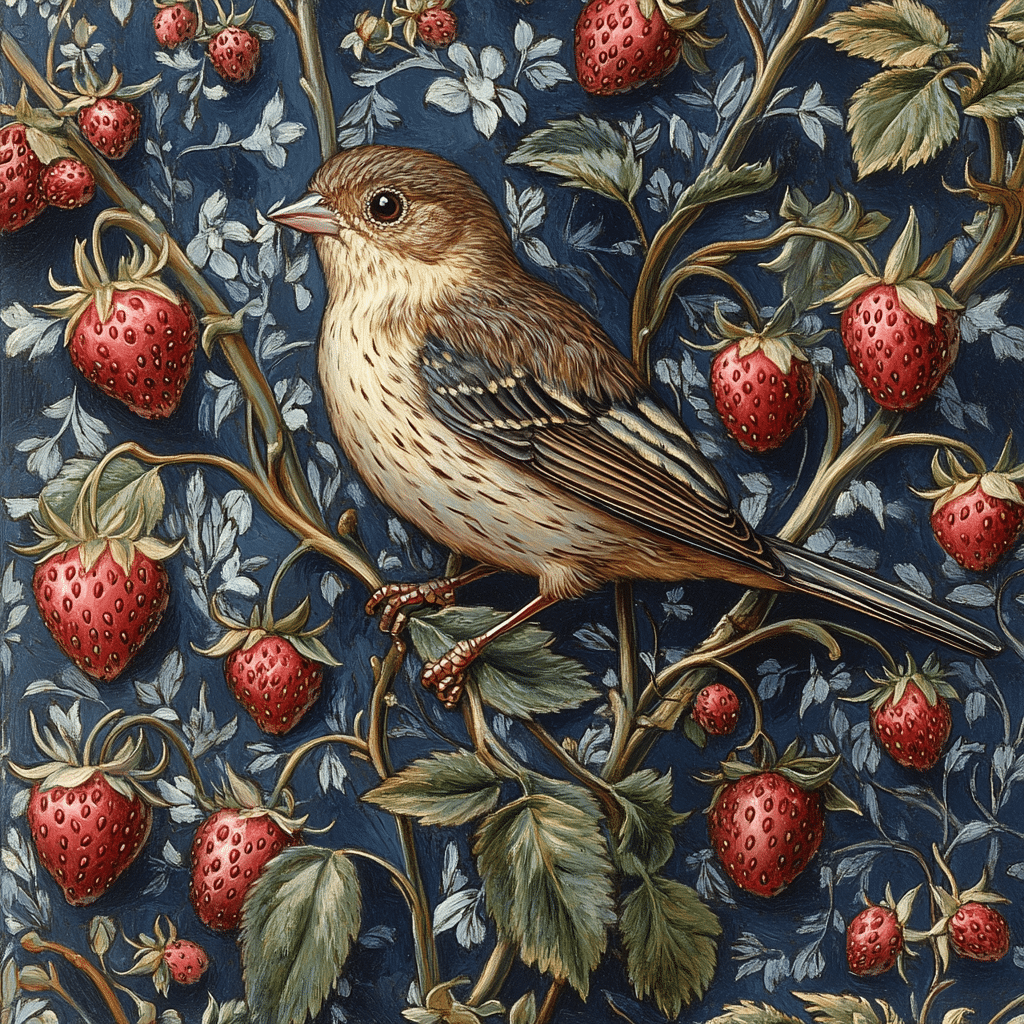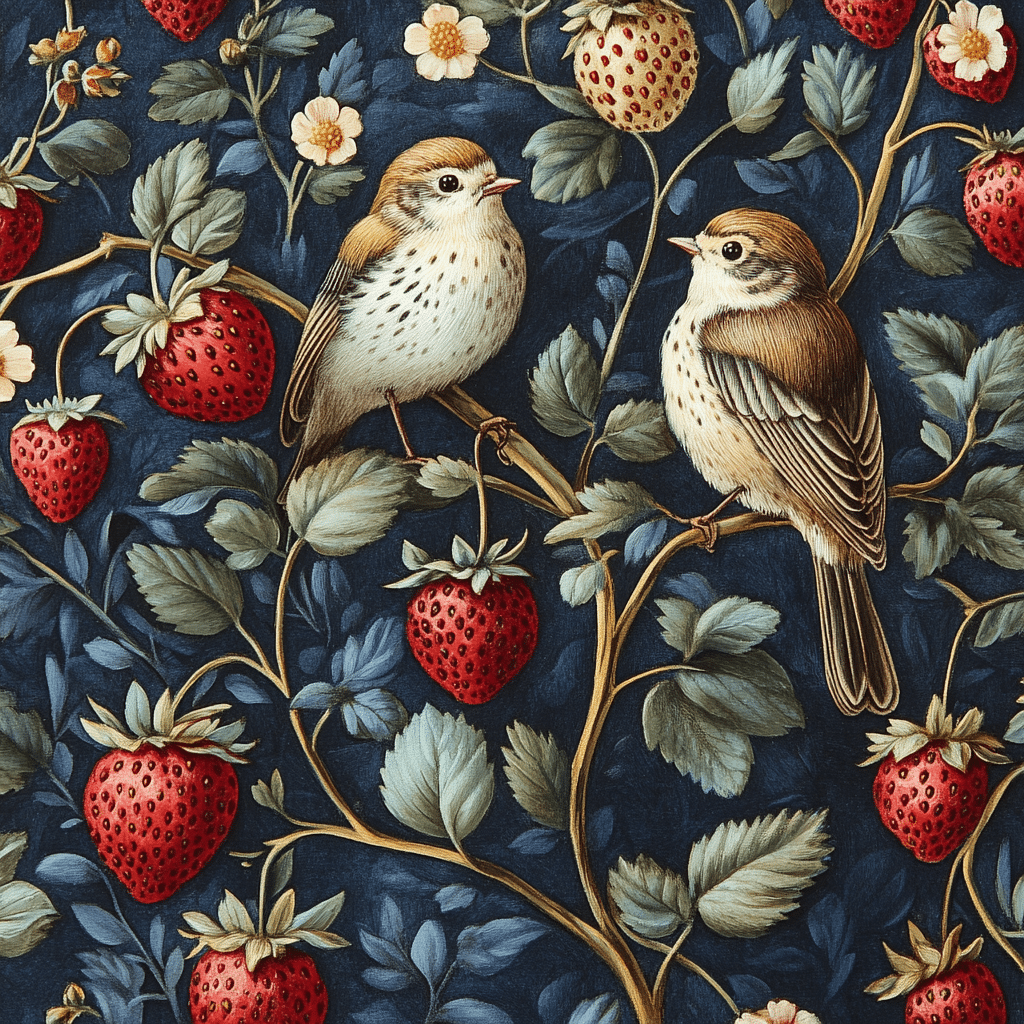The William Morris Strawberry Thief design is a pivotal piece in the history of textile art, born in 1883 from the mind of William Morris—a titan of the Arts and Crafts Movement. This artful design, featuring charming thrushes in pursuit of plump strawberries, captures Morris’s deep-seated passion for nature and artistry. Through swirling foliage and intricate detailing, the William Morris Strawberry Thief elevates craftsmanship to an art form, moving away from the industrial replication that dominated the 19th century. It stands as a testament to Morris’s belief that beauty and functionality can coexist harmoniously.
The Origins of the William Morris Strawberry Thief Design
To grasp the importance of the William Morris Strawberry Thief, we need to peek into its roots. Morris was inspired by organic aesthetics, often taking cues from the flora and fauna in his garden. It’s said he found a deep connection with nature, which he wanted to reflect authentically in his work. The Strawberry Thief pattern is rife with symbols of joy and prosperity; the thrushes represent both mischief and beauty, making each textile piece feel alive with narrative.
Furthermore, Morris employed block printing to produce this design. This technique allowed for a remarkable vibrance in colors, a contrast to the dreary mass-production methods of his contemporaries. Rich reds, verdant greens, and sunny yellows blend seamlessly in the William Morris Strawberry Thief, highlighting Morris’s masterful use of color to evoke the lush abundance of nature.
Morris’s approach was not just about aesthetics, though; it was also a philosophical stance against the mechanization of art. His work encouraged a return to handcrafted artistry, emphasizing the value of skilled labor. In everything he created, including the Strawberry Thief, Morris reaffirmed his belief in the deep connection between beauty and craftsmanship.

Top 5 Fascinating Facts About William Morris Strawberry Thief
The Artistic Techniques Behind William Morris Strawberry Thief
Delving deeper into the William Morris Strawberry Thief, one can’t overlook the artistic techniques that define it. Morris relied on the traditional method of block printing, a labor-intensive approach that granted the design its vibrant and intricate qualities. Each block used for the printing contained a wealth of detail, capturing the essence of the patterns as they were stamped onto fabrics.
Morris’s color palette is another aspect worth noting. The design utilizes a harmonious blend of colors, drawing upon nature’s inspiring hues. It’s a skillful balance of deep reds against lush greens, creating a visual symphony that pulls the viewer in. This selective use of color tells a story of abundance, making every piece that features the William Morris Strawberry Thief a narrative experience.
Moreover, the method of application was a dedication to craftsmanship. Morris stressed the significance of creating art by hand, giving each piece an authenticity that machine production couldn’t replicate. In a world increasingly leaning towards automation, Morris’s commitment to handcraft serves as a reminder of the beauty inherent in the human touch.

The Enduring Influence of William Morris Strawberry Thief in Modern Culture
Today, the William Morris Strawberry Thief is much more than a historical design; it continues to influence modern culture in numerous ways. Home décor brands such as Morris & Co. proudly feature this renowned pattern in various textiles and wallpapers, seamlessly integrating classic design into contemporary settings. Furthermore, brands like H&M Home have adopted repetitive patterns from Morris, appealing to consumers who appreciate charm and tradition.
Beyond home décor, the influence of the William Morris Strawberry Thief stretches into lifestyle products, engaging new audiences. Today’s consumers, particularly those who appreciate trendy aesthetics, are drawn to how classic patterns update and enhance modern designs. This blend of nostalgia and contemporary flair speaks to the timeless appeal of Morris’s work.
Fashion is also witnessing the starred resurgence of this design. Numerous designers have taken inspiration from the Strawberry Thief, incorporating its aesthetics into clothing lines aimed at younger audiences. The marriage of classical design with modern fashion allows for a unique expression of style while honoring a rich artistic history.
Contemporary Reinterpretations of William Morris Strawberry Thief
New designers are exploring fresh takes on the William Morris Strawberry Thief, ensuring its legacy thrives. Fashion retailer New Look has tapped into this energy, featuring the Strawberry Thief in their seasonal collections. The youthful twist on this classic pattern illustrates how longstanding artistry can resonate with contemporary tastes.
Online platforms like Etsy have become a hub for artisans creating sustainable home goods inspired by Morris’s designs. These sellers embrace eco-friendly practices, crafting products that align with the modern consumer’s values, while also celebrating the depths of William Morris Strawberry Thief. It’s a vivid cross-section of the old and the new, merging artistry with environmental consciousness.
Beyond individual craftsmanship, brands now embark on partnerships that breathe new life into the William Morris Strawberry Thief. Collaborations often involve limited editions that continue to showcase this iconic design while making it relevant in today’s marketplace. This melding of various artistic visions not only keeps Morris’s spirit alive but also speaks volumes about the collaborative power of modern design.
Crafting a Sustainable Future Inspired by William Morris Strawberry Thief
As conversations around sustainability gain traction, the William Morris Strawberry Thief is a foundational element in the quest for eco-friendly practices in design. Morris advocated for the value of craftsmanship, and today’s designers echo that sentiment by emphasizing sustainable materials and ethical production methods, creating textiles that are as environmentally conscious as they are beautiful.
Companies like West Elm are adopting Morris’s ethos, crafting limited edition homeware that aligns with sustainable practices. These products reflect the aesthetics of the William Morris Strawberry Thief while also honoring the planet. It’s a vital transformation that fosters a renewed appreciation for craftsmanship in a world where mass production often overshadows traditional art forms.
In reflecting on the William Morris Strawberry Thief, we find ourselves at a crossroads between history and modernity. The compelling beauty that has adorned textiles for over a century encourages us to engage with sustainability and artistry alike. By learning from the foundations Morris laid, we can push toward a future in design that respects both heritage and the environment.
In the end, the William Morris Strawberry Thief isn’t just a pattern; it’s a call to appreciate craftsmanship, embrace sustainability, and find beauty in the natural world. As we weave this ethos into our daily lives, the narrative of Morris’s iconic design continues to inspire and innovate—and surely, that’s a legacy worth cherishing.
William Morris Strawberry Thief: Fun Trivia and Interesting Facts
The Artistic Roots of the William Morris Strawberry Thief
Ever wondered what inspired the stunning design of the William Morris Strawberry Thief? The story goes that Morris was captivated by the sight of thrushes stealing strawberries from his garden. This moment sparked a creative fire, leading him to craft one of the most iconic textile designs of the Arts and Crafts movement. The intricate patterns and rich colors in the Strawberry Thief design reflect nature’s beauty, a love that can be seen in other forms of art, much like the beauty of casual wicker furniture that’s perfect for relaxing summer gatherings.
Design and Cultural Impact
The William Morris Strawberry Thief is more than just a lovely pattern; it also played a key role in popularizing hand-crafted textiles and returning to traditional craftsmanship. Morris believed in the significance of art in daily life, advocating for a shift away from mass production. Interestingly, his designs have transcended generations, adding charm to modern homes just as much as they did in the Victorian era. Speaking of home, if you’re a first-time homeowner, incorporating such timeless designs can be a striking way to express your personality.
Additionally, Morris’s work invited a fresh perspective on art and design, much like how we sometimes ponder why Does romance make You awkward? Engaging with patterns like the Strawberry Thief can feel personal, almost like a conversation that sparks deep emotions, much like the kind of communication crucial in addiction recovery. The depth of this design continues to inspire countless designers and enthusiasts, making it not just a decorative piece but a cornerstone of cultural heritage. Whether you’re combing through vintage fabrics or considering home decor, finding the right elements can feel as thrilling as attending a concert featuring someone like Nick Lachey, who’s surprisingly taller than you’d think!
A Dive into Nature and Textile Innovation
If you dive deeper into the history of the William Morris Strawberry Thief, you’ll notice how nature influenced Morris’s work, resonating with the sustainable practices of today. It’s a fascinating connection that reminds us of the importance of conservation, akin to understanding the Windhoek windhoek in Namibia. In an age where we often overlook our surroundings, Morris’s vision calls us back to appreciating the small wonders—even those as everyday as a garden.
Ultimately, the enduring appeal of the Strawberry Thief pattern showcases the artistic innovation that can arise from simple inspirations. With its timeless charm and historical significance, it offers a sweet taste of the past that’s perfect for contemporary living. Whether dressing up your home or simply appreciating art, the influence of this iconic design is everywhere, and it’s a delightful topic to share over coffee, perhaps while looking up Baltimore city Tickets for the latest exhibition celebrating Morris’s contributions!




